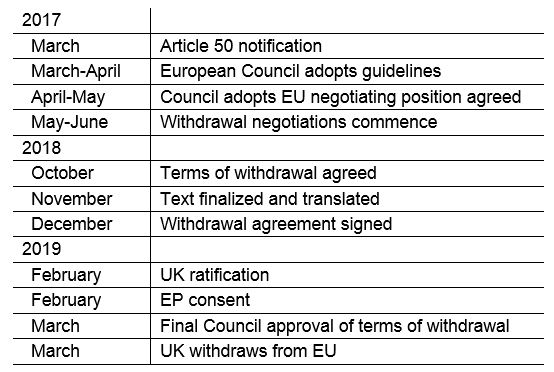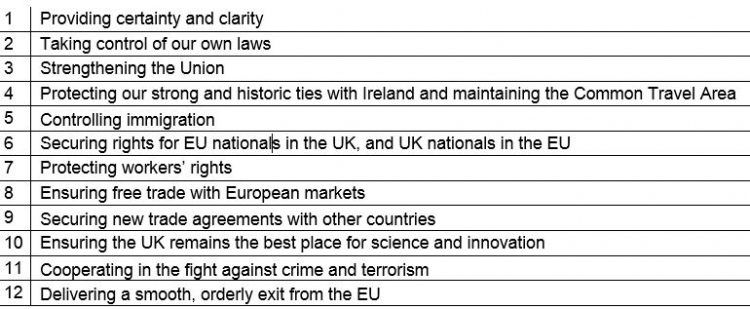Brexit: What Next Once Article 50 is Triggered?
The triggering of Article 50 by PM Theresa May is imminent, but what will happen over the next two-years? Professor David Phinnemore outlines the projected timetable for negotiations and the main issues that will be up for discussion.

The UK referendum on 23 June 2016 on whether to remain in or leave the European Union (EU) returned an overall majority (51.9%) in favour of ‘leave’. In order to proceed with a withdrawal from the EU, the UK needs to formally notify EU leaders in the European Council of its intention to do so in accordance with Article 50 of the Treaty on European Union (TEU).
On assuming office, the UK Prime Minister, Theresa May, announced that she intended to trigger Article 50 before the end of March 2017. Her intention to proceed using the Royal Prerogative, and so without a parliamentary vote, was challenged. The High Court, in its Miller ruling, ruled that a vote in Parliament was necessary. The UK Government appealed. The Supreme Court on 24 January 2017 upheld the High Court’s ruling. The Government was therefore forced to secure parliamentary approval for triggering Article 50.
The European Union (Notification of Withdrawal) Bill was duly published by the UK Government on 26 January 2017. It has so far progressed through the House of Commons where MPs on 8 February 2017 approved the bill at Third Reading by 494 to 122 votes. The bill has now moved to the House of Lords which will formally begin its deliberations on 20 February 2017.
It is the Government’s expectation that the bill will be approved by early March allowing the Prime Minister to submit the notification of intention to withdraw required under Article 50 possibly at the next meeting of the European Council on 9-10 March 2017.
Article 50 Negotiations
Once the notification is submitted, the two years provided for the withdrawal process will commence.
It is clear from procedural requirements and statements that the negotiations on the terms of withdrawal will need to be concluded well before the end of the two-year period. The stages include the negotiation of the terms of withdrawal and their required approval by the UK Parliament and the European Parliament (EP).
In terms of sequencing, the UK Government has recently announced that MPs will vote on the withdrawal agreement prior to the EP. The essential stages with a projected timeline are as follows:

The withdrawal negotiations will cover a range of issues including: the rights of EU citizens in the UK and of UK citizens in the EU; the relocation of EU agencies currently based in the UK; the UK Government’s liabilities with regards, for example, the pensions of UK nationals who are or have been EU officials; the regulation of the UK-EU border; and the UK’s withdrawal from the EU budget. The negotiations will also be ‘taking account of the framework for [the UK’s] future relationship with the Union’ (see below).
Provision exists in Article 50 for the EU-27 at the level of the European Council to agree unanimously, with the agreement of the UK Government, to extend the two year period. There has been little indication to date that this option will be used.
The UK Government appears determined to complete the withdrawal process as swiftly as possible and the EU-27 are keen to complete the process before the EP elections in May 2019 and negotiations on the next multi-annual financial framework.
Beyond the Withdrawal Negotiations: the post-Brexit UK-EU relationship
The triggering of Article 50 will set in motion not only negotiations on the terms of the UK’s withdrawal from the EU but also a process involving multiple sets of negotiations, some running concurrently, others, proceeding sequentially. It will also see a number of domestic UK processes to be initiated.
A key set of negotiations will be on the post-Brexit UK-EU relationship. These will not formally begin until after the UK leaves the EU. However, as part of the withdrawal negotiations, the UK and the EU will be ‘taking account of the framework for [the UK’s] future relationship with the Union’; so informal negotiations will take place.
In a White Paper entitled The United Kingdom’s exit from and new partnership with the European Union and published on 2 February, the Government has set out its position for the Article 50 negotiations and the negotiations on the new agreement or agreements that will govern post-Brexit UK-EU relations. The White Paper is essentially an expanded version of Theresa May’s Lancaster House speech on 17 January 2017. It lists twelve priorities:

Most readings of the White Paper conclude that the UK Government is intent on an essentially ‘hard’ Brexit, i.e. one involving withdrawal from the customs union and the Single Market and most areas of existing cooperation. They also flag an essential UK Government ‘red line’, namely: withdrawal from the EU will ‘bring an end to the jurisdiction of the Court of Justice of the European Union in the UK’. A refusal to accept the jurisdiction of the Court will limit the scope for extensive cooperation with the EU in the new post-Brexit relationship.
Viewed from Northern Ireland, the essential effects of this are that: customs controls will need to be applied to the movement of goods from the UK to the EU; and there will no longer necessarily be the free movement of goods, services, capital and people between the UK and the EU. The White Paper does, however, contain among the UK Government’s priorities a commitment to maintain the Common Travel Area. Of note too is the statement that the UK Government remains ‘fully committed to the Belfast Agreement and its successors’.
There is also a dedicated three-page Annex entitled ‘UK/Ireland’ in which the UK Government ‘recognises that Northern Ireland’s particular circumstances present a range of particular challenges to be taken into account when preparing for our exit from the EU’. To this end the UK Government will be ‘working with the Northern Ireland Executive to ensure that Northern Ireland’s particular circumstances are factored into our wider preparations’. Beyond such statements, there is very little detail on Northern Ireland.
Indeed, generally the White Paper is vague on what exactly the post-Brexit UK-EU relationship will comprise beyond ‘an ambitious and comprehensive Free Trade Agreement’ and ‘a new strategic partnership’. Moreover, the White Paper only sets out the UK Government’s priorities.
Whether these priorities can be secured will depend on the position the EU-27 adopts in the negotiations on the new UK-EU relationship. Also, it is unlikely that the terms of the new UK-EU relationship will be concluded within the two years of the Article 50 negotiations.
The future of UK participation in EU programmes and cooperation processes may not be known until after then, although it is expected that some clarity will emerge during the negotiations. A set of transitional arrangements governing the period between withdrawal and the new relationship will therefore need to be negotiated.
Beyond the UK-EU Relationship: trade agreements with other countries and organizations
An essential reason behind the UK Government’s decision not to seek continued participation in the EU’s customs union is the desire to regain the competence to pursue its own trade policy and conclude its own trade agreements with other countries and organizations.
Such agreements can only come into force once the UK has left the EU. Also, new agreements can only be negotiated once the UK has established its own ‘tariff schedules’ with the World Trade Organization (WTO). At present the UK’s tariff schedules are part of the EU’s tariff schedules and need to be separated. Again, this can only formally take place with the UK’s actual departure from the EU.
Once the UK’s tariff schedules have been established – they need to be agreed by the other 163 members of the WTO – trade agreements covering goods and services can be concluded. The expectation is that the UK Government will seek to replicate any arrangements currently in place through agreements the EU has with third countries and organizations. These will take time to negotiate.
Managing Brexit Domestically
The White Paper confirms that withdrawal from the EU will be accompanied by the entry into force of a Great Repeal Act. This will provide legal certainty by removing the European Communities Act 1972 from the statute book and by converting EU law that currently applies to the UK – the ‘acquis’ – into domestic law. Consequently, there will be legal continuity on the day after the UK leaves the EU. Thereafter, the UK Parliament ‘and, where appropriate, the devolved legislatures’ will determine which elements of the acquis to keep, amend or repeal.
A second process referred to in the White Paper relates to ‘repatriated powers’. This concerns what happens to the competences that are currently exercised at the EU level but which will return to the UK on withdrawal from the EU. A number of these competences are expected to be passed to the devolved administrations in line with the existing devolution settlements. The UK Government’s view is that this is to be determined; the Scottish and Welsh governments are of the view that the process is to be automatic.
Eight months have passed since the UK referendum on remaining in or leaving the EU. Formal notification under Article 50 that the UK intends to withdraw from the EU will be a key moment in the UK’s relations with the EU. For many it will be a point of no return. Others are of the view that the process can be reversed. Either way, notification will not only trigger a formal process of withdrawal, but also pave the way for other contingent negotiations and processes.
Each will be complex, politically demanding and administratively challenging. None is likely to be completed swiftly. As a process of withdrawing from the EU, dealing with the associated domestic constitutional and legal contingencies and establishing new trading and other relationships with other countries, ‘Brexit’ will take considerably more than a few years to complete.
The featured image has been used courtesy of a Creative Commons licence.




